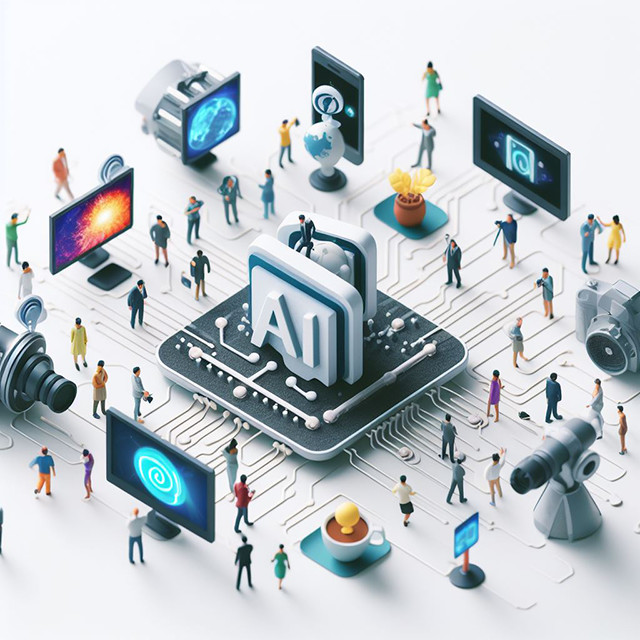Using AI to Personalize the Customer Experience
Artificial intelligence (AI) is rapidly transforming the way businesses interact with their customers. By using AI to collect and analyze data, businesses can gain a deeper understanding of their customers' needs and preferences. This information can then be used to personalize the customer experience in a variety of ways, from recommending products to providing customer service.
What is Personalized Customer Experience?
Personalized customer experience (CX) is the process of tailoring the customer's experience with a brand to their individual needs and preferences. This can be done through a variety of channels, including website, mobile app, social media, and in-store.
How Does AI Personalize the Customer Experience?
AI can be used to personalize the customer experience in a variety of ways, including:
- Recommending products: AI can be used to analyze a customer's past purchases, browsing history, and social media activity to recommend products that they are likely to be interested in. This can be done on a website, mobile app, or in-store.
- Providing customer service: AI can be used to answer customer questions, resolve issues, and provide support. This can be done through a chatbot, email, or phone call.
- Targeting marketing: AI can be used to target marketing messages to specific segments of customers. This can be done based on demographics, interests, or past purchase history.
- Optimizing the customer journey: AI can be used to track a customer's journey through a website or app. This information can then be used to optimize the customer journey and make it more seamless.
What Can Companies Do to Personalize the Customer Experience with AI?
There are a number of things that companies can do to personalize the customer experience with AI, including:
- Collect and analyze data: The first step is to collect and analyze data about your customers. This data can include demographics, interests, past purchase history, and social media activity.
- Build a customer profile: Once you have collected data about your customers, you can build a customer profile. This profile will help you to understand your customers' needs and preferences.
- Use AI to personalize the customer experience: You can use AI to personalize the customer experience in a variety of ways, such as recommending products, providing customer service, targeting marketing, and optimizing the customer journey.
- Measure the results: It is important to measure the results of your efforts to personalize the customer experience. This will help you to see what is working and what is not.
Examples of Companies in Barcelona that Use AI to Personalize the Customer Experience
There are a number of companies in Barcelona that are using AI to personalize the customer experience. For example:
- Amazon uses AI to recommend products to customers, provide customer service, and target marketing. Amazon's AI-powered recommendation engine is one of the most sophisticated in the world. It uses a variety of factors to recommend products to customers, including their past purchases, browsing history, and social media activity. Amazon's customer service chatbots are also powered by AI. These chatbots can answer customer questions, resolve issues, and provide support. Amazon uses AI to target marketing messages to specific segments of customers. This allows Amazon to reach the right customers with the right message at the right time.
- Mango uses AI to create a personalized dressing room experience for customers. When customers enter a Mango dressing room, they are greeted by a digital assistant that asks them a few questions about their style and preferences. The digital assistant then uses this information to recommend products that would be a good fit for the customer. Mango's AI-powered dressing room experience is designed to help customers find the perfect outfit faster and easier.
- Beaabloo uses AI to analyze customer behavior in stores and recommend products. Beaabloo's AI-powered technology tracks customer movement in stores, identifies the products that they are interested in, and recommends similar products. Beaabloo's technology is used by a number of retailers, including Mango, Zara, and El Corte Inglés.
- Sephora's efforts to personalize the customer experience in Barcelona are paying off. Sephora's Barcelona stores have seen a significant increase in sales and customer satisfaction since the company began implementing its personalized customer experience strategy.
- Nextail uses AI to optimize inventory and recommend products to customers. Nextail's AI-powered technology analyzes historical sales data, weather forecasts, and social media activity to predict which products will be in demand. Nextail's technology then recommends these products to customers. Nextail's technology is used by a number of retailers, including Zara, H&M, and Asos.
Benefits of Personalized Customer Experience
There are a number of benefits to providing a personalized customer experience, including:
- Increased customer satisfaction: Customers are more likely to be satisfied with a brand if they feel that their needs and preferences are being met. This can lead to repeat business, positive word-of-mouth, and increased loyalty.
- Increased sales: Personalized CX can lead to increased sales by helping businesses to cross-sell and upsell products. For example, if a customer buys a dress from a retailer, the retailer could recommend a matching scarf or handbag.
- Reduced costs: Personalized CX can help businesses to reduce costs by improving efficiency and reducing the need for customer service. For example, if a customer has a question about a product, they can be directed to a chatbot or FAQ page instead of having to call customer service.
- Increased brand reputation: A reputation for providing a personalized customer experience can help to attract new customers and build loyalty among existing customers. This can lead to increased sales and market share.
Additional Benefits of Personalized Customer Experience
In addition to the benefits listed above, personalized customer experience can also lead to a number of other benefits, including:
- Improved customer retention: Customers who have a positive CX are more likely to continue doing business with a brand. This can lead to increased sales and profits over time.
- Increased customer engagement: Customers who feel that they are being heard and understood are more likely to be engaged with a brand. This can lead to increased social media engagement, website traffic, and word-of-mouth referrals.
- Enhanced brand reputation: A reputation for providing a personalized customer experience can help to attract new customers and build loyalty among existing customers. This can lead to increased sales and market share.



Comments
Post a Comment